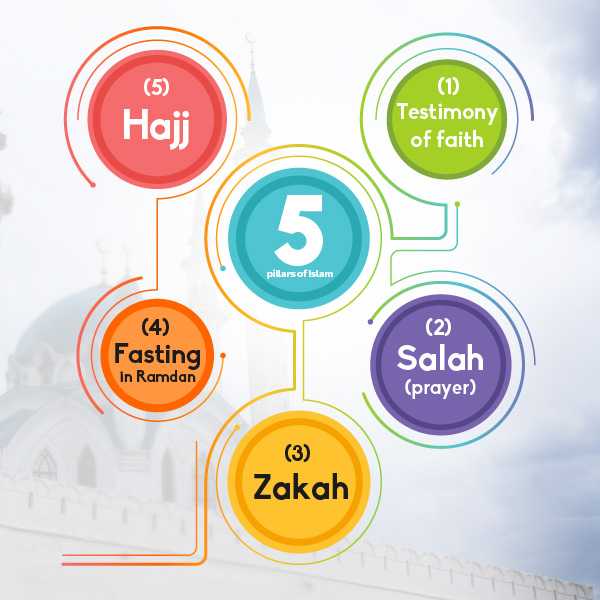Five Pillars of Islam

Five Pillars of Islam indicates submission to the will of God and obedience to His law. Everything and every phenomenon in the world, other than man and jinn is administered totally by God-made laws; they are obedient to God and submissive to His laws. Man possesses the quality of having intellect and freedom of choice, thus he/she is invited to submit to the will of God and obey His law to become a Muslim. Submission to the will of God, together with obedience to His beneficial law, becoming a Muslim, is the best safeguard for man’s inner peace and harmony.
Islam has five pillars that the tent of Muslims is established on them, and according to them, the Muslim’s obedience to Allah is measured. Islam includes all the aspects of Muslim life; his/her manners, behavior, and even the way he/she eats and gets dressed. Islam is based on five pillars that establish the basis of the daily life of a true Muslim.
“Five Pillars of Islam” is an online free course on “Al-Azhar Quran Teaching” which is dedicated to teaching the five pillars of Islam to non-Arab Muslims and new reverts. The tutors who teach this course are well qualified and competent as they are graduates of the University of al-Azhar.
It is mandatory for each Muslim to be aware of the five pillars of Islam and to teach them to his/her kids.
The first pillar is to testify that there is no god but Allah and that Muhammad is the Messenger of Allah. The second is to establish the five daily prayers as long as you are alive. The third is to pay Zakat (alms) if your wealth reaches the limit specified for Zakat. The fourth pillar is to observe fasting in Ramadan as long as you are not sick or traveling. The fifth is to perform Hajj (pilgrimage) if you are financially and physically capable.
As a Muslim, it is our duty to understand the rights we owe to Allah (SWT). In this option, the tutors will explain in detail the 5 Pillars of Islam. These pillars are: to have faith that there is no god worthy of worship except Allah and Muhammad is his messenger, prayer performance which is performed five times a day and is a strong link between the worshiper and Allah, giving the Zakat and it is one of the most essential principles of Islam in which everything belongs to Allah, and that wealth is possessed by human beings in trust, the fasting of Ramadan in which every year all Muslims fast from dawn until sundown, abstaining from food, beverages, and sexual relations, the pilgrimage to Mecca and it is an obligation only for those who are physically and financially able to perform it. The pillars of Islam enhance the Muslim tent and help him to be a true Muslim.
All these are the pillars of Islam that Islam has been stabilized on them and Allah order us to do in the Quran and promised us if we keep these pillars and perform them for the sake of Allah only, we will win the Hereafter and the paradise, also the prophet Muhammad orders us in sunnah to follow Allah commands to perform these pillars in the right way to be a true Muslims.
Five Pillars of Islam
As soon as the Islamic armies of the Arab countries conquered new lands, they began to erect mosques and palaces and to commission other works of art to express their beliefs and culture. Many aspects of Islamic religious practices have emerged and been coded. The practice of the Islamic religion, which means “obedience to God”, is based on the principles of the “five-columned lesson”, to which all members of the Ummah Islamic community must adhere.
- I believe in the profession – Şahada
I believe that the profession is the shahada, the most complete expression of Islam. He simply says, “There is only God, Muhammad is his prophet.” This underlines the monotheistic nature of Islam. It is a very popular phrase in an Arabic manuscript with many manuscripts and places of worship.
- Daily prayers – salah
Muslims should pray five times a day. This does not mean that they have to go to the mosque to pray; instead, a daily salad or prayer should be repeated five times a day. Muslims can pray everywhere; However, they seek to pray in Mecca. Faithful praise rises and kneels and folds several times, then touches the ground or the prayer rug on his forehead as a symbol of respect and submission to God. Many Muslims will visit the lunch mosque on Friday to pray and listen to Khutba’s sermon.
- Charitable distribution – Zakat
Charity is the third column. Although Muslims are not defined in the Qur’an, they believe that they should share their wealth with those who are lucky in the community of believers.
- Fasting during Ramadan – Saum
During Ramadan, which is the ninth month of the Islamic calendar, Muslims are expected to fast from dusk to dusk. While there are exceptions for patients, the elderly, and pregnant women, they should all hide food and drink in daylight.
- Hajj
All talented Muslims are obliged to request a pilgrimage to Mecca and the surrounding holy places at least once in their lives. Hajj focuses on visiting Kabab and walking seven times.The Hajj takes place in the twelfth month of the Islamic calendar.
Register Now
REGISTER NOW
